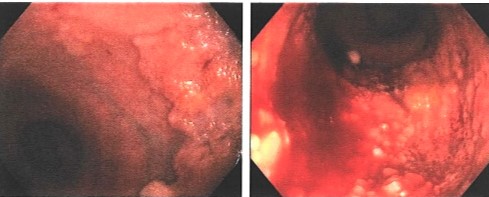Sunday Poster Session
Category: IBD
P1258 - A Rare Rectal Finding in Ulcerative Colitis: HPV Risk in the Era of Advanced Immunomodulators
Sunday, October 26, 2025
3:30 PM - 7:00 PM PDT
Location: Exhibit Hall

Joselyn De Jesus-Gonzalez, MD (she/her/hers)
Ponce Health Sciences University
Ponce, PR
Presenting Author(s)
Joselyn De Jesus-Gonzalez, MD, Ahmed Morales, MD, FACG, Kathia Rosado, MD
Ponce Health Sciences University, Ponce, Puerto Rico
Introduction: Condyloma acuminatum (CA) is a benign epithelial proliferation caused by human papillomavirus (HPV), typically affecting the anogenital region. While perianal involvement is common, rectal mucosal CA is rare, particularly in immunosuppressed individuals. Patients with ulcerative colitis (UC) on long-term immunosuppressive therapy may be at increased risk for HPV-related lesions due to impaired immune surveillance.
Case Description/
Methods: We report the case of a 60-year-old Puerto Rican female with a history of UC and hypertension in deep remission under Tofacitinib therapy. She presented for routine UC follow-up and underwent a surveillance colonoscopy, which revealed a friable, flat, slightly raised whitish lesion in the rectal mucosa, approximately 5 cm from the anal verge, extending nearly circumferentially. Histopathological analysis of endoscopic biopsies confirmed condyloma acuminatum without dysplasia. The patient had previously undergone a colonoscopy one year prior, showing a colon that appeared endoscopically normal, including biopsies with quiescent disease activity. Upon further discussion, she disclosed a new sexual partner and unprotected anal intercourse. Given the extent of the disease, she was referred for colorectal surgery for further management.
Discussion: This case emphasizes the importance of recognizing rectal mucosal CA as a potential hidden site within the condyloma spectrum, particularly in immunosuppressed UC patients. While the exact mechanism of rectal CA development remains unclear, chronic mucosal inflammation combined with immunosuppression may contribute synergistically to HPV persistence and lesion development. This reinforces the need for comprehensive sexual history-taking and individualized risk assessment when prescribing immunosuppressive therapy, especially in patients with prior HPV exposure, perianal disease, or a history of sexually transmitted infections. In the absence of standardized surveillance guidelines for rectal CA in IBD patients, early detection, close follow-up, and a multidisciplinary approach are critical to mitigate the risk of recurrence and malignant transformation.

Figure: Condyloma acuminatum extending circumferentially in the rectal mucosa.
Disclosures:
Joselyn De Jesus-Gonzalez indicated no relevant financial relationships.
Ahmed Morales indicated no relevant financial relationships.
Kathia Rosado indicated no relevant financial relationships.
Joselyn De Jesus-Gonzalez, MD, Ahmed Morales, MD, FACG, Kathia Rosado, MD. P1258 - A Rare Rectal Finding in Ulcerative Colitis: HPV Risk in the Era of Advanced Immunomodulators, ACG 2025 Annual Scientific Meeting Abstracts. Phoenix, AZ: American College of Gastroenterology.
Ponce Health Sciences University, Ponce, Puerto Rico
Introduction: Condyloma acuminatum (CA) is a benign epithelial proliferation caused by human papillomavirus (HPV), typically affecting the anogenital region. While perianal involvement is common, rectal mucosal CA is rare, particularly in immunosuppressed individuals. Patients with ulcerative colitis (UC) on long-term immunosuppressive therapy may be at increased risk for HPV-related lesions due to impaired immune surveillance.
Case Description/
Methods: We report the case of a 60-year-old Puerto Rican female with a history of UC and hypertension in deep remission under Tofacitinib therapy. She presented for routine UC follow-up and underwent a surveillance colonoscopy, which revealed a friable, flat, slightly raised whitish lesion in the rectal mucosa, approximately 5 cm from the anal verge, extending nearly circumferentially. Histopathological analysis of endoscopic biopsies confirmed condyloma acuminatum without dysplasia. The patient had previously undergone a colonoscopy one year prior, showing a colon that appeared endoscopically normal, including biopsies with quiescent disease activity. Upon further discussion, she disclosed a new sexual partner and unprotected anal intercourse. Given the extent of the disease, she was referred for colorectal surgery for further management.
Discussion: This case emphasizes the importance of recognizing rectal mucosal CA as a potential hidden site within the condyloma spectrum, particularly in immunosuppressed UC patients. While the exact mechanism of rectal CA development remains unclear, chronic mucosal inflammation combined with immunosuppression may contribute synergistically to HPV persistence and lesion development. This reinforces the need for comprehensive sexual history-taking and individualized risk assessment when prescribing immunosuppressive therapy, especially in patients with prior HPV exposure, perianal disease, or a history of sexually transmitted infections. In the absence of standardized surveillance guidelines for rectal CA in IBD patients, early detection, close follow-up, and a multidisciplinary approach are critical to mitigate the risk of recurrence and malignant transformation.

Figure: Condyloma acuminatum extending circumferentially in the rectal mucosa.
Disclosures:
Joselyn De Jesus-Gonzalez indicated no relevant financial relationships.
Ahmed Morales indicated no relevant financial relationships.
Kathia Rosado indicated no relevant financial relationships.
Joselyn De Jesus-Gonzalez, MD, Ahmed Morales, MD, FACG, Kathia Rosado, MD. P1258 - A Rare Rectal Finding in Ulcerative Colitis: HPV Risk in the Era of Advanced Immunomodulators, ACG 2025 Annual Scientific Meeting Abstracts. Phoenix, AZ: American College of Gastroenterology.
